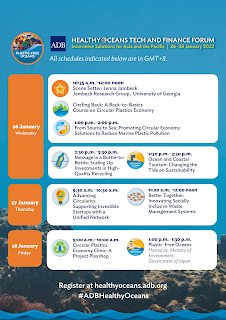The
best waste is no waste.
Half of the world population lived here pic.twitter.com/6GdxGkF62r
— Epic Maps 🗺️ (@Locati0ns) December 21, 2021
Some Inspiring Virtual Plastic-Free Oceans Expo Participants
- Save Philippine Seas (SPS)
- MyMizu - Encouraging Refilling water - aggregator app (Mizu is water in Japanese)
- Plastic Bank, Philippines, Building Ethical Recycling Ecosystems in Coastal Communities
- Minderoo Foundation, Global Plastic Watch: Monitoring Plastic Waste from Space
- Ton To Ton – Sustainable Impact with Plastic Credit
- Alliance to End Plastic Waste – Plastic Bottle Sustainability by 2030
- Envirotech – "We reuse your refuse"
- TrashLucky – a lottery in Thailand from sending trash
- PlusTreat – Reverse Vending Machine
- RiverRecycle – River cleaning as a free service
- Royal HaskoningDHV - “The Interceptor” (The Ocean Cleanup) to Clean Asian Rivers
Key Takeaways from ADB Healthy Oceans: Plastic-Free Oceans
- Community buy-in (widespread adopting) + Technology = System Change (Learning from MyMizu).
- Jenna Jambeck: People tend to focus on end of life but we need to design out things that don’t work and address the whole circle – upstream changes – reduce, redesign.
- We have to make technology and incentives work to bring back our tradition of not wasting and re-using things to compensate for the recent prevalence of today's throwaway-convenience-single-use culture. Asia-Pacific as a whole has always had a sustainability mindset and it has to be a priority to bring that attitude back to the forefront in the modern fast-paced, modern world but without adding to the care-giving burdens of women.
- Government and community buy-in has be a priority to close the loop and ensure that the complicated circular economy is plastics is a reality.
- High quality plastics recycling and policy to create demand for it and avoid virgin plastics is vital to enable circularity.
- Access to credit for such circular plastic economy projects by linking to ccean health - Green Bonds, Blue Bonds, Climate Finance, Blue Loans.
- Circularity Assessment Protocol - CAP - is a key tool in gathering data and doing a holistic plastic audit.
- Chennai has had both a CAP conducted (IIT Kharagpur and Wildlife Institute of India) as well as had a thorough collection of baseline data on the informal recycling sector thanks to the efforts of Kabadiwalla Connect.
- Socially-inclusive solutions to waste management needs to be a top priority.
- Incomes and incentives needs to flow into the most marginalized and poorest parts of a community to ensure that sachets are replaced and there is no leakage of "orphan plastics" into the environment or landfills and water bodies.
- The Life in Plastic: An Experts Clinic for Unfantastic Pollution Problems - plastics playshop on Day 3 of the forum yielded some great insights into tacking the plastics problem holistically by analyzing the why and how of the problem as well as deep diving to arrive at what would be the benefits, ricks and challenges of setting up shop while also digging deep to arrive at the metrics of what a successful impact of closed loop is.
- Reverse logistics (closing the loop), feedstock, energy equipment, community buy-in (behavior change); media in community communication education, beverage companies, community shops, supermarkets.
- Finance is key to enable circular plastics economy.
- There has to be a sharing of best practices of waste management and plastics management to enable scale-up and use-adapt-innovate modes of localizing solutions that work on a community-level.
- Thailand's SuperBin & TrashLucky – a lottery in Thailand from sending trash are great modes to incentivize behavior change.
From failed plastic bans to tsunami of plastic waste with the pandemic, the plastic pollution problem has exploded and there is an urgency in implementing SDG12 (responsible consumption and production) in plastics.
Community participation - making communities and cities sustainable (SDG 11)
When talking about best practices in closing the loop and recycle, upcycle, reuse - the community + high tech combination has yielded some great results as mentioned by Dr Alagu Perumal of LIBA at his talk in Chennai in July 2019.
There are a wide-range of issues tackled in community, state and national level across the Asia-Pacific that provides rich resources to use and adapt to local plastic pollution issues.
The key learning with regard to plastics should be there no space for single-use as there is no away in throwaway.
Earth is an Ocean planet and restoring the health of the oceans is the blue print to achieve the Global Goals (SDGs).
The Spilhaus World Ocean Map



Comments
Post a Comment